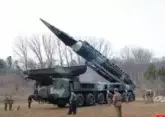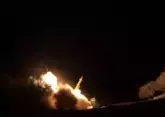Japanese Defense Minister Takeshi Iwaya said Saturday that North Korea remains a threat to global security, urging the international community to work closely to achieve denuclearization of the Korean Peninsula. The Mainichi reports in its article Japan's defense chief warns N. Korea remains global threat that Iwaya also criticized Pyongyang's recent firing of short-range ballistic missiles as being in violation of U.N. Security Council resolutions, while emphasizing that defense authorities should maintain deterrence against North Korea.
"We need to remind ourselves of the undeniable fact that there has been no essential change in North Korea's nuclear and missile capacities," Iwaya said in a speech at the Asia Security Summit, known as the Shangri-La Dialogue, in Singapore.
Pyongyang fired projectiles that appeared to be short-range ballistic missiles on May 4 and 9, about two months after U.S. President Donald Trump and North Korean leader Kim Jong Un failed to strike a deal during their second summit in late February.
In the wake of the collapse of the meeting in the Vietnamese capital Hanoi, denuclearization negotiations between the United States and North Korea have been at a standstill, and Pyongyang has resumed provocative actions against Washington.
"The most pressing risk is that the collective resolve of the international community abates" before North Korea takes concrete measures toward complete denuclearization, Iwaya said.
"Now is the time to make a concerted effort" to fully implement U.N. resolutions aimed at thwarting North Korea's nuclear and ballistic missile ambition, he added, stressing the importance of "robust deterrence" against Pyongyang.
Iwaya added that Tokyo is eager to have a dialogue with Pyongyang, saying Japan "seeks to normalize its relations with North Korea through a comprehensive resolution of outstanding issues of concern such as abductions."
Recently, Japanese Prime Minister Shinzo Abe has expressed willingness to hold a summit with Kim "without conditions" to resolve the long-standing issue of the country's nationals abducted by North Korean agents in the 1970s and 1980s.
At the same session on the Korean Peninsula, Stephen Biegun, U.S. special representative for North Korea, also said Washington would continue talks with Pyongyang despite the missile launches.
"President Trump is confident" that Kim will meet the commitments that he made at their first summit in Singapore in June last year, Biegun said. "Through continued negotiations, we can continue to close the gaps that separate our two countries."
Meanwhile, South Korean Defense Minister Jeong Kyeong Doo voiced concern that tensions on the peninsula may be rekindled, depending on future developments of denuclearization talks.
At the Feb. 27-28 summit, Trump and Kim fell short of a deal due to the gap between Washington's insistence on denuclearization and Pyongyang's demand for sanctions relief.
Kim has sought the easing of international economic sanctions, claiming that his country has already carried out concrete steps toward denuclearization.
But the U.S. has argued that the relaxing of economic sanctions would require North Korea to scrap all its nuclear facilities and programs.
By provoking the United States, Kim is believed to be trying to gain concessions from Trump, who wants to be able to tout results during his re-election campaign next year, some analysts say.










